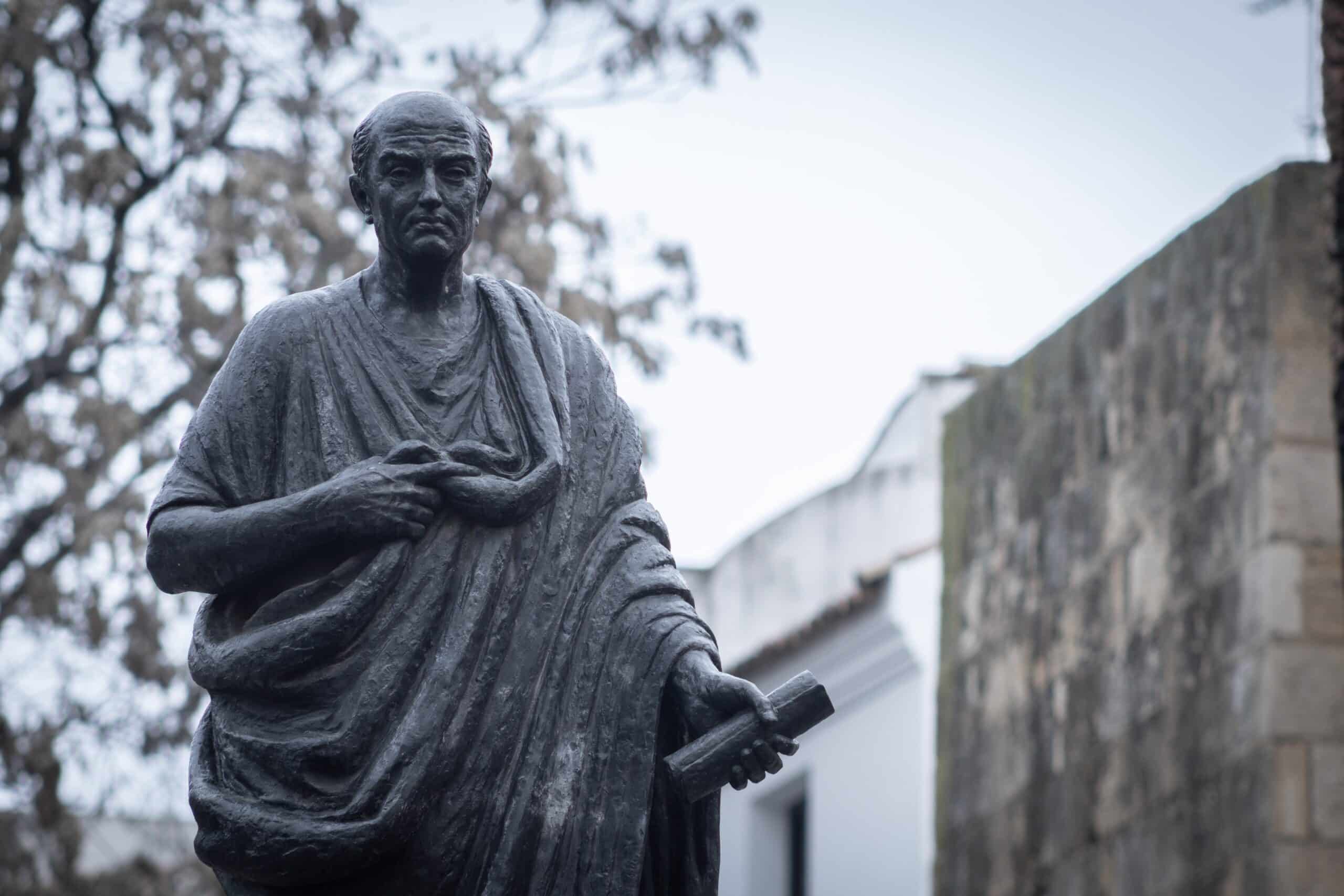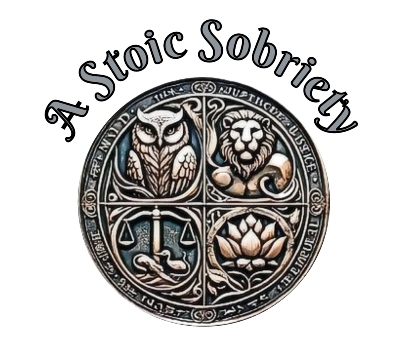Seneca: Life, Philosophy & Legacy of the Roman Stoic
Seneca, known as Seneca the Younger, was a notable Roman Stoic philosopher, statesman, and playwright who lived from about 4 BCE to 65 CE. His legacy is found primarily in writings on ethics, rationality, and the virtues of Stoicism. Some of his most famous works include “Letters to Lucilius,” “On the Shortness of Life,” and “On Tranquility of Mind.” These texts explore themes like the importance of wisdom, the transient nature of life, and how to achieve peace of mind amidst adversity.
He was born around 4 BCE in Corduba, present-day Córdoba, Spain, to a notable and wealthy family. His father was Seneca the Elder, a famous rhetorician who significantly influenced his early education.
As a child, Seneca moved to Rome, where he received the broad education typical for young men of his status. He studied rhetoric and philosophy, particularly Stoicism, which profoundly shaped his thoughts and writings. Notable philosophers and orators, including the Attalus and Epicurean Sotion, oversaw his education.
Health-wise, Seneca faced significant challenges throughout his life. He frequently mentions weakness and exhaustion, suggesting he may have suffered from chronic fatigue. Additionally, he had asthma and some other form of severe lung condition, perhaps tuberculosis. These health challenges certainly influenced his philosophy and writings about the fragility of life and the importance of embracing mortality.
Seneca’s Chaotic Political Career
Seneca’s long political career was defined by his rise to power, two exiles from Rome, his role as an advisor to Emperor Nero, and the complexities of his political legacy.
His political career began to flourish during the reign of Emperor Claudius, who appointed him quaestor, a position responsible for financial administration, in 49 CE. He would have been 51 years old at the time, so he entered politics late in life. In the role of quaestor, he gained valuable experience in governance and financial management, which would be key skills for his future public service.
In 41 CE, Emperor Claudius halted Seneca’s political ascent by accusing him of adultery with Caligula’s sister, Julia Livilla, and conspiracy against the throne. He was given the choice between execution and exile. He chose the latter, retreating to Corsica, a remote Mediterranean island.
Corsica was a rugged island with none of Rome’s cultural aspects. He lost access to his family, friends, and the comforts of the life he had known. He viewed solitude as an opportunity for introspection and philosophical contemplation, although he sometimes suffered from boredom and bitterness. He drew inspiration from Stoic teachings to find meaning and purpose in his predicament.
Seneca’s exile lasted for nearly eight years, during which he devoted himself to the study of philosophy and the composition of his most famous works, including “On Anger” and “Consolation to Helvia,” a letter written to his mother to alleviate her grief over his exile. In 49 CE,
His fortunes took a favorable turn when Emperor Claudius granted him clemency and allowed him to return to Rome. Freed from exile, he resumed his political career and quickly rose to prominence once again, serving as a tutor and advisor to the young Nero, who had ascended to the throne in 54 CE.
Seneca was appointed as his advisor, or “consul,” wielding considerable influence within the imperial court. He kept his principles in the forefront of his mind as he tried to shape government policies. Based on these principles, he emphasized the importance of justice, moderation, and what was best for the Roman citizens.
His influence on Nero’s early reign was notable, but it did not have the lasting effect he hoped for. Nero was known to be an impulsive and cruel leader. Seneca worked hard to counterbalance these traits, urging him to focus on the good of the empire rather than selfish pursuits.
Despite his efforts with Nero, he faced guilt by association as Nero’s reign became increasingly tyrannical and oppressive. Some historians point out the discrepancy between Seneca’s involvement and his principles; however, others view it as him doing his best for the greater good of Rome and exerting control as opportunities arose.
Seneca became increasingly disappointed with the emperor’s leadership as Nero’s behavior became more erratic and cruel. In 62 CE, Seneca retired from public life, officially citing health reasons, though many believe he resigned due to his growing dissatisfaction with Nero. He went to his villa in Campania to focus on writing and philosophy, seeking escape from the politics of Rome.
Although he was retired from politics, Seneca was accused of participating in the Pisonian conspiracy. The conspiracy revolved around a plan by some Senators, Military leaders, and nobles to end Nero’s reign.
Despite Seneca’s protestations of innocence, Nero’s paranoia and distrust led to his decision to force the philosopher to commit suicide in 65 CE.
His practice of resilience through the worst of times in his service to the Roman Empire and his dedication to philosophy continues to inspire generations. His legacy endures long after his exile has faded into history.
Seneca’s Timeless Philosophical Contributions
Seneca’s deep thoughts about life and ethics were a critical part of his political life, but it wasn’t just in politics that he showed his wisdom. His ideas about philosophy grew when he was away from the public eye, like when he was in exile or taking breaks from his busy life. These quieter moments allowed him to write essential works on living a good life. Even though he was busy in politics, his philosophical efforts never ceased and defined him as much or more than his political service.
Seneca’s letters, essays, and dialogues on Stoic philosophy are the legacy of his philosophical contributions. He left us “Letters to Lucilius” and essays like “On Anger,” “On the Shortness of Life,” and “On the Happy Life,” which are all valuable resources in the study of Stoicism. The key area of contributions are:
Ethics: Seneca emphasized the importance of living by nature and reason which is a central tenet of Stoic ethics. He taught that true happiness and fulfillment come from virtue rather than external possessions or wealth. Seneca’s works, such as “Letters to Lucilius” and “On the Happy Life,” offer practical guidance on courage, wisdom, and self-control.
Resilience: Seneca taught and demonstrated the vital importance of resilience and inner strength in facing life’s challenges. He believed that adversity provided an opportunity for growth and self-improvement and encouraged his readers to face difficulties head-on. We find his dedication to building resilience in his writings on anger management, dealing with grief, and accepting fate.
Philosophy of Nature: The Stoics view nature as a rational and interconnected system governed by universal laws. Seneca encouraged his readers to align their lives with the natural order of the cosmos and accept that change is constant. The ever-changing nature of life and the importance of living in harmony with nature are central themes in his philosophical works.
Virtue Ethics: Virtue is viewed as the highest good and vital to a meaningful life. Seneca argued that true virtue is developing moral excellence and wisdom rather than seeking external achievements or social status. The focus on self-examination and acting ethically in all situations are key to a virtuous life and are found throughout his writings.
Practices: Seneca offered practical advice and exercises for implementing Stoic principles in daily life. The Stoics believe that knowledge alone will not lead to inner peace. Actions and regular practice are necessary to achieve the benefits of philosophy. He teaches us that thinking self-discipline, resilience, and living by one’s values is not enough. We must put this philosophy into action.
Death and Legacy
Seneca died in 65 CE by his own hand at the order of Nero for his alleged involvement in the Pisonian Conspiracy. According to Tacitus, a Roman historian and politician, he calmly accepted his fate. His action was consistent with the Stoic practice of amor fati, or the love of fate.
Tacitus further describes Seneca’s suicide, noting it was not a quick ordeal. In his first attempt, he severed his veins, but his blood flowed too slowly to bring on death. His second attempt was to ingest poison, but this, too, failed to end his life. Finally, he was placed in a steam bath, where he suffocated, bringing the ordeal to an end.
Despite the challenges his political career imposed upon his dedication to Stoic principles, Seneca is considered one of the greatest Stoic philosophers in history. His his commitment to Stoic principles leaves a lasting legacy of how to live a virtuous life. His writings, after the passing of more than 75 generations, continue to inspire with timeless wisdom on the Stoic virtues.
Resources:
Encyclopedia Britannica – Seneca Biography
Stanford Encyclopedia of Philosophy – Seneca Entry
Internet Encyclopedia of Philosophy – Seneca Entry
World History Encyclopedia – Seneca




0 Comments